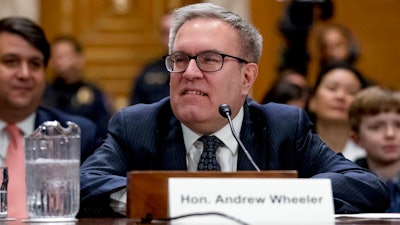
WASHINGTON (AP) — The Environmental Protection Agency says it is moving forward with a response to a class of long-lasting chemical contaminants amid criticism from members of Congress and environmentalists that the agency has not moved aggressively enough to regulate them.
Acting EPA Administrator Andrew Wheeler was expected to announce the plan during a briefing Thursday in Philadelphia.
In an interview with ABC News Live, Wheeler called the so-called forever chemicals, perfluoroalkyl and polyfluoroalkyl compounds, or PFAS, "a very important threat."
Wheeler said the agency was moving forward with the process under the Safe Drinking Water Act that could lead to new safety thresholds for the presence of the chemicals in water, but he did not commit in the interview to setting standards.
The chemicals are found in consumer products ranging from fabrics, rugs and carpets, cooking pots and pans, outdoor gear, shampoo, shaving cream, makeup and even dental floss. Increasing numbers of states have found them seeping into water supplies.
Scientific studies have found "associations" between the chemicals and cancer, thyroid disease, ulcerative colitis and other health issues.
With communities around the country finding PFAS in their drinking water, Republican and Democratic lawmakers pressed Wheeler on PFAS during his confirmation process.
Republican Sen. Shelley Moore Capito, whose state of West Virginia was one of the first where PFAS-contaminated water systems were linked to health problems in people, voted for Wheeler's appointment in committee earlier this month only after Wheeler privately assured her the EPA would tackle the problem.
Capito was one of 20 senators writing Wheeler this month to demand mandatory limits on two phased-out versions of PFAS. They pressed Wheeler for other "immediate actions" to protect the public from other versions of the industrial compounds
Senate Minority Leader Chuck Schumer, D-N.Y., demanded earlier this month that the EPA set legal limits for PFAS in drinking water. If EPA balked, Wheeler "didn't deserve" to be EPA head, Schumer said.
Environmental groups expect the EPA response to do little to move the agency forward from its 2018 pledges to tackle PFAS.
Scott Faber of the Environmental Working Group said that without firm action and deadlines, he expected the EPA announcement to be no more than a "plan to plan."
In the ABC interview, Wheeler also indicated that the agency would target those communities most affected.
"We know where the chemicals were manufactured, and we know a lot of the areas where they were actually used, so we're going into those communities to see whether or not the water in those communities are contaminated, he said.
Betsy Southerland, a former science and technology director in EPA's Office of Water, told The Associated Press that Wheeler's plan appeared designed to delay the process and encourage states to set their own standards. That would create more uncertainty about the proper threshold for requiring water treatment for PFAS, said Southerland, who resigned in 2017 to protest the Trump administration's environmental policies.
"It allows industry and federal agencies that should be actively cleaning up to sit back and say, 'It's a big mess, no one knows what the correct number is, so we won't take any action until the confusion is settled,'" she said.






















